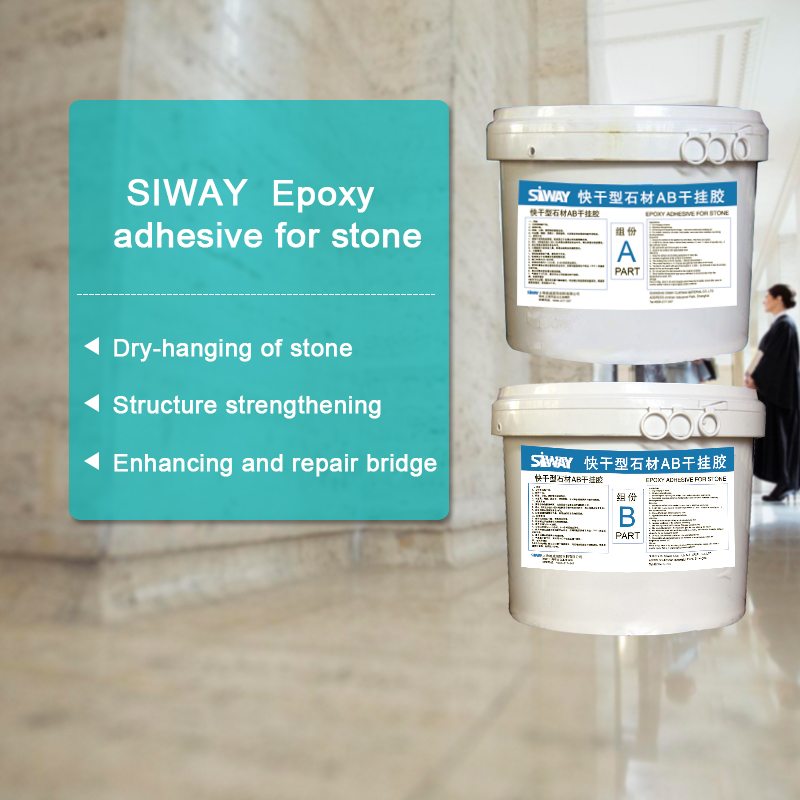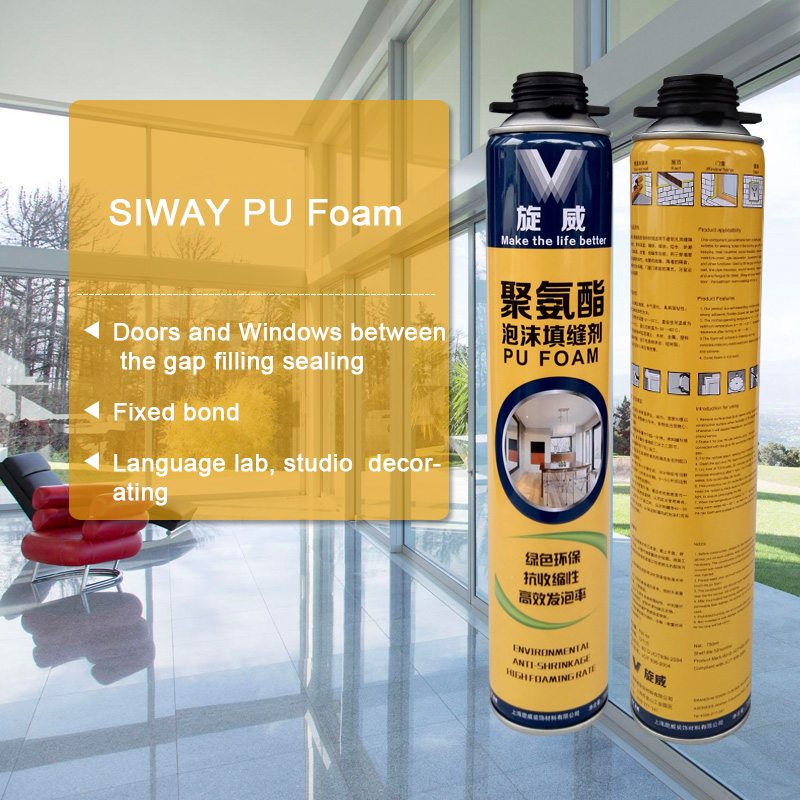High definition wholesale Siway SV-602 Epoxy Structural Adhesive A/B Export to Czech republic
Short Description:
Description SV-602 is a 2-part structural epoxy adhesive developed for such application as dry fixing cladding. It has strong adhesion to metals, woods, reinforced plastics stone, ceramic and masonry. It is the best choice for bonding parts which must withstand weather, moisture and temperature fluctuations. SV-602 will adhere with minimum surface preparation and has a low coefficient of expansion. Key Features 1. Room temperature curing Epoxy adhesive 2. Fast cure at room temperature,...
We will make every effort to be outstanding and perfect, and accelerate our steps for standing in the rank of international top-grade and high-tech enterprises for High definition wholesale Siway SV-602 Epoxy Structural Adhesive A/B Export to Czech republic, Welcome to contact us if you are interested in our product, we will give you a surprice for Qulity and Price.
Description
SV-602 is a 2-part structural epoxy adhesive developed for such application as dry fixing cladding. It has strong adhesion to metals, woods, reinforced plastics stone, ceramic and masonry. It is the best choice for bonding parts which must withstand weather, moisture and temperature fluctuations. SV-602 will adhere with minimum surface preparation and has a low coefficient of expansion.
Key Features
1. Room temperature curing Epoxy adhesive
2. Fast cure at room temperature, <40 min for reaching a tack-free status under standard environment (STD: 23℃, 50% humidity)
3. Mix ratio of 1:1 by volume or by weight
4. Good mechanical property
5. Bonds a wide variety of building materials
6. Good waterproofing and chemical resistance
Basic Application
1, the external walls of stone material, ceramic and other hang bond;
2, concrete, ceramics, stone, wood and other prefabricated split, bonding and jointing;
3, concrete, stone and so on crack repair;
4, the structure of the localization, anchor, reinforcement and reinforcement.
Technical data sheet
The following data is for reference only and is not recommended for the specification
| Shear strength | Stainless steel-stainless steel/Standard conditions | ≥18 | JC887-2001 | ||
| Pressure shear strength | Stone-stone/ Standard conditions | ≥12 | |||
| Stone-stone/ The freeze-thaw cycle 50 times | ≥10 | ||||
| Stone – stainless steel/ Standard conditions | ≥12 | ||||
| Standard conditions:Temperature=23℃,relative humidity=50%,48 hours curing | |||||
| attribute | SV-602-A | SV-602-B | SV-602(After mixing) | ||
| Colour | gray | white | grey | ||
| Density(g/cm³) | 1.8 | 1.8 | 1.8 | ||
| Viscosity(PaS) | 200-400 | 150-250 | |||
| Effective operating time(23℃) | N/A | N/A | 20min | ||
Certification
JC 887-2001
Color
Part A-Grey Paste/Part B-White Paste
Package
9kg/9kg per unit and 15kg/15kg per unit
Shelf life
12 months
Note
If you want the TDS or MSDS or other details, please contact with our sales person.
https://www.stuccoplastering.com/tools/
Howdy folks, The Amazon link above is your personal link to purchase any of the tools we use for all of our how-to teaching guide video’s, we demonstrate and explain in detail so that you may get a greater understanding of the stucco/plastering application,
if you’re interested in the trowels and tools we use please click on our Amazon account above:
live long and Plaster
Once you’re on the link or page I show the most common tools but you can scroll along and find other tools you’re looking for too in the same link. Remember we teach you how to repair your #1 investment, “Your home,” so save the dough and DIY with the tools we show on our link.
Plus this supports us too so we can keep making these teaching videos’
All from kirk giordano your favorite Stucco nerd and plaster geek guy.
Subscribe for more stucco content:
https://www.youtube.com/subscription_center?add_user=StuccoPlastering
Kirk Giordano Plastering Inc.
https://www.StuccoPlastering.com
https://www.BayAreaPlastering.com
Connect with us!
https://www.facebook.com/kirk.giordanoplastering
https://plus.google.com/+StuccoPlastering
https://twitter.com/GiordanoStucco
https://www.youtube.com/StuccoPlastering
https://www.linkedin.com/in/kirk-giordanoplastering-1b40551b/
https://www.pinterest.com/kirkgiordano/
https://vk.com/kirkgiordanoplastering
https://www.instagram.com/kirkgiordanoplastering
plaster, it’s everywhere you want to be
Hello everyone, in this video I show another way of repairing or fixing a large structural crack with polyurethane caulking in a stucco wall.
The crack shown here is structural, meaning it will always move.
I feel it’s best to use a flexible material under the circumstances. There are about 20 different ways to repair the crack properly.
The best way tearing off all the stucco and re-doing the complete wall.
But I get beat up if I suggest this to most customers.
Again, I will say there are many ways to fix a structural crack.
I am implying to just fill it with stucco is the easiest, but far from the best as when a structural crack moves again and it will, as it’s structural in the first place, the stucco will simply crack with it.
(for me structural means when it rains plus a bunch more reason, the area or wall will lift then when dryer conditions occur, settle, thus structural)
If a polyurethane caulking if used first and the texture can’t be matched with that caulking a person cam apply a stucco with sand to match a texture using stucco on top of all this caulking,
Is a bonding agent necessary?
Depends,
If the caulking is allowed to set and or dry, yes a bonding agent would now be necessary to adhere the new stucco to this area,
if added while the caulking is still curing is a bit tricky as can it affect the integrity of the caulking?
Good question, yes.
But for a temporary fix, say 15 years, it is an intelligent alternative for keeping the rain water out to the alternative of tearing the wall apart and trying to locate why the walls is moving and or separating.
Other popular plastering videos tips below
This video shows 2 Glass Block Windows being installed in my basement windows. I can be reached on Facebook.
Contents, Rounded to nearest minute:
At 0:51 step 1: Materials needed;
At 1:32 step 2: Demolition of old wooden frame;
At 2:00 step 3: Mortar application to form rough opening;
At 6:07 step 4: Window insertion and setting with glass block mortar;
At 11:27 completed window installation minus silicone caulk.
Turn off CC unless you really need it. Some of my titles interfere with the closed caption titles.
Speaking does not begin until 2:24 just in case you think something is wrong with the sound.


